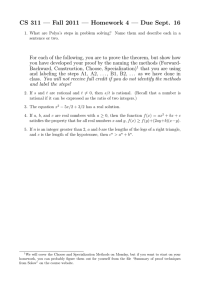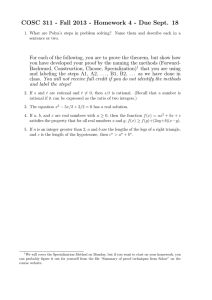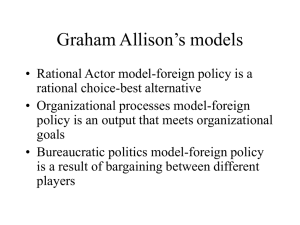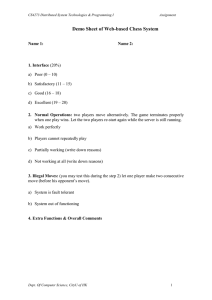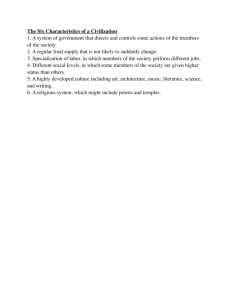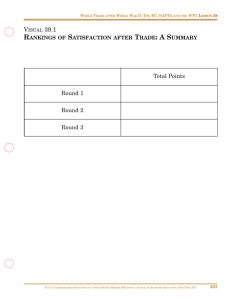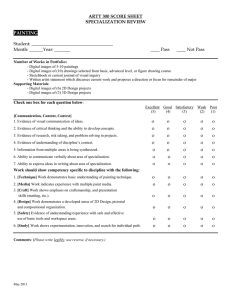The Use of Knowledge in Society Lecture 4: Heterogeneous Information
advertisement
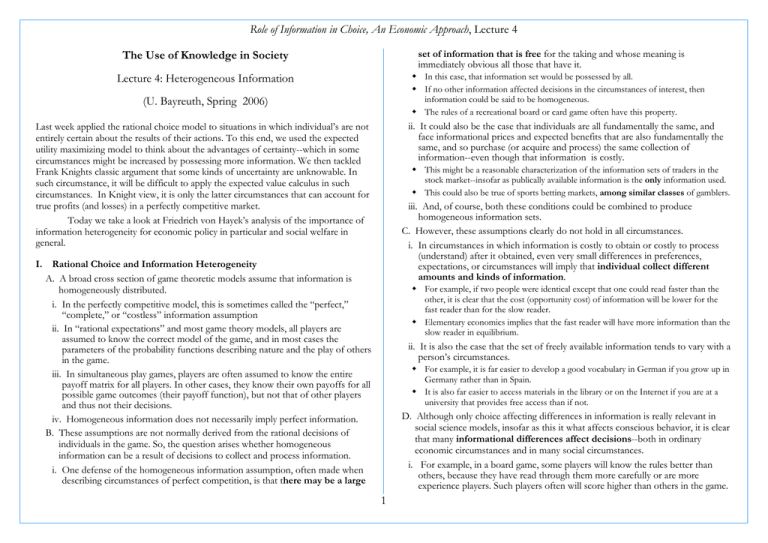
Role of Information in Choice, An Economic Approach, Lecture 4 set of information that is free for the taking and whose meaning is immediately obvious all those that have it. The Use of Knowledge in Society w In this case, that information set would be possessed by all. w If no other information affected decisions in the circumstances of interest, then information could be said to be homogeneous. w The rules of a recreational board or card game often have this property. Lecture 4: Heterogeneous Information (U. Bayreuth, Spring 2006) ii. It could also be the case that individuals are all fundamentally the same, and face informational prices and expected benefits that are also fundamentally the same, and so purchase (or acquire and process) the same collection of information--even though that information is costly. Last week applied the rational choice model to situations in which individual’s are not entirely certain about the results of their actions. To this end, we used the expected utility maximizing model to think about the advantages of certainty--which in some circumstances might be increased by possessing more information. We then tackled Frank Knights classic argument that some kinds of uncertainty are unknowable. In such circumstance, it will be difficult to apply the expected value calculus in such circumstances. In Knight view, it is only the latter circumstances that can account for true profits (and losses) in a perfectly competitive market. Today we take a look at Friedrich von Hayek’s analysis of the importance of information heterogeneity for economic policy in particular and social welfare in general. w This might be a reasonable characterization of the information sets of traders in the stock market--insofar as publically available information is the only information used. w This could also be true of sports betting markets, among similar classes of gamblers. iii. And, of course, both these conditions could be combined to produce homogeneous information sets. C. However, these assumptions clearly do not hold in all circumstances. i. In circumstances in which information is costly to obtain or costly to process (understand) after it obtained, even very small differences in preferences, expectations, or circumstances will imply that individual collect different amounts and kinds of information. I. Rational Choice and Information Heterogeneity A. A broad cross section of game theoretic models assume that information is homogeneously distributed. i. In the perfectly competitive model, this is sometimes called the “perfect,” “complete,” or “costless” information assumption ii. In “rational expectations” and most game theory models, all players are assumed to know the correct model of the game, and in most cases the parameters of the probability functions describing nature and the play of others in the game. iii. In simultaneous play games, players are often assumed to know the entire payoff matrix for all players. In other cases, they know their own payoffs for all possible game outcomes (their payoff function), but not that of other players and thus not their decisions. iv. Homogeneous information does not necessarily imply perfect information. B. These assumptions are not normally derived from the rational decisions of individuals in the game. So, the question arises whether homogeneous information can be a result of decisions to collect and process information. i. One defense of the homogeneous information assumption, often made when describing circumstances of perfect competition, is that there may be a large w For example, if two people were identical except that one could read faster than the other, it is clear that the cost (opportunity cost) of information will be lower for the fast reader than for the slow reader. w Elementary economics implies that the fast reader will have more information than the slow reader in equilibrium. ii. It is also the case that the set of freely available information tends to vary with a person’s circumstances. w For example, it is far easier to develop a good vocabulary in German if you grow up in Germany rather than in Spain. w It is also far easier to access materials in the library or on the Internet if you are at a university that provides free access than if not. D. Although only choice affecting differences in information is really relevant in social science models, insofar as this it what affects conscious behavior, it is clear that many informational differences affect decisions--both in ordinary economic circumstances and in many social circumstances. i. For example, in a board game, some players will know the rules better than others, because they have read through them more carefully or are more experience players. Such players often will score higher than others in the game. 1 Role of Information in Choice, An Economic Approach, Lecture 4 ii. A stock broker or entrepreneur that has information that is not available to others, may be able to profit from it -- in a manner that others cannot. iii. A consumer that has information about prices that others do not may be able to purchase products at lower prices than others. iv. A military leader that has information that others do not may be able to construct a more effective plan of engagement than others can. E. Differences in information sets can, thus, make “symmetric looking” circumstances be less “symmetric” than they appear. i. Some players in the game setting of interest will be better able to judge strategies than others. ii. This does not always mean that more informed players profit from their information. i. “Mastery” in this sense means that a specialist has a higher marginal product in his area of specialized knowledge than (most) others would have without such a complete information set. ii. On the other hand, mastery of one area also tends to imply that those individuals are not very productive at other tasks. C. Some forms of specialization allows groups of specialists to be assembled as teams that are far more productive than a group of non-specialists. i. That is to say, the team o f such specialists produce far more “output” in a day’s work than a group of non-specialists can. w Notice that this is not the case for all groups of specialists. w The specialties must have “complementarity” in the activity of interest. ii. There is a sense in which such teams may be said to “aggregate” the information available to team members--even though their collective information is not really assembled in one place (or mind). w For example, a sophisticated player chooses a mixed strategy rather than a deterministic one--he or she may wind up doing exactly as well as a less informed or less sophisticated player who adopts a deterministic strategy in the same game that goes unrecognized. w In some cases, a bit of new information may actually bias expectations that were previously nearly unbiased, because the new information is also incomplete and thus may over weight some of the new or additional variables. w That is to say, such teams make use of the entire group’s information when producing the team’s “output.” iii. Of course, not every form of increased specialization increases productivity within a firm or output within a market economy w Both “over specialization” or “miss-specialization” are possible. w But, historically increases in productivity are often associated with greater specialization.. iii. However, on average, one expects individuals with more or better information about alternatives in particular circumstances will do better than those with less or worse information, because they are less likely to make mistakes. iv. The advantage of specialization, of course, explains why college and trades education look like they do, and why salaries are often far higher for specialists than for the “unskilled.” II. Specialization, Information Aggregation and Organization A. A good deal of what economists and academics call specialization has to do with collecting and processing relatively narrow information sets. w Specialist often have far higher marginal value products than non specialists w (MVP = P*MP in competitive markets, their higher MVP is normally because MP is higher rather than P ). w Economists know “only” about economics. w Accountants know “only” about accounting practices in their home country. w Civil Engineers know about static structures (bridges, tunnels, pipelines, etc.) but not electronics or dynamic structures. w Hair dressers can creatively cut hair but not build bridges. w Plumbers can determine pipe layouts but not build buildings, and so forth. D. Note that market forces, thus, tend to increase the extent to which information sets of individuals are different, because markets tend to reward higher productivity with higher salaries. And, the “right” kind of specialization increases an individual’s marginal value product. w (Doctors vs. buggy whip makers?) B. Such specialization allows one to “master” particular information sets--which are sometimes called skills, even in cases in which the results are informational rather than physical abilities. E. Overall, the effects of markets, individual circumstances, and talents at information collecting and processing imply that the information sets of individual will tend to be heterogeneous in a variety of ways that affects decisions. 2 Role of Information in Choice, An Economic Approach, Lecture 4 III. Hayek’s “The Use of Knowledge in Society,” American Economic Review 35 (No. 4, September, 1945): 519-30 A. This paper by F. A. Hayek is still widely cited today. the question of what is the best use of the available means is implicit in our assumptions. The conditions which the solution of this optimum problem must satisfy have been fully worked out and can be stated best in mathematical form: put at their briefest, they are that the marginal rates of substitution between any two commodities or factors must be the same in all their different uses. ii. This, however, is emphatically not the economic problem which society faces. And the economic calculus which we have developed to solve this logical problem, though an important step toward the solution of the economic problem of society, does not yet provide an answer to it. The reason for this is that the "data" from which the economic calculus starts are never for the whole society "given" to a single mind which could work out the implications and can never be so given. w The social science citation index lists over 700 citations in scholarly journals w Google scholar lists 1670 citations (today.) B. The paper is important for several reasons, many of which are relevant for this course. i. First, he reminds economists that information is not homogeneous as often assumed. w Information or knowledge is decentralized, varied, and much of the information is useful. w The central problem confronting societies is how to make use of all the information that people possess among them. w w ii. Second, he argues that markets are able to “aggregate” the decentralized knowledge that exists in a manner that enormously increases national and world output. iii. Third, one of the important purposes of prices is to provide information about the relative scarcities of final goods, intermediate goods, and raw materials. iii. Today it is almost heresy to suggest that scientific knowledge is not the sum of all knowledge. But a little reflection will show that there is beyond question a body of very important but unorganized knowledge which cannot possibly be called scientific in the sense of knowledge of general rules: the knowledge of the particular circumstances of time and place. It is with respect to this that practically every individual has some advantage over all others because he possesses unique information of which beneficial use might be made, but of which use can be made only if the decisions depending on it are left to him or are made with his active cooperation. We need to remember only how much we have to learn in any occupation after we have completed our theoretical training, how big a part of our working life we spend learning particular jobs, and how valuable an asset in all walks of life is knowledge of people, of local conditions, and of special circumstances. To know of and put to use a machine not fully employed, or somebody's skill which could be better utilized, or to be aware of a surplus stock which can be drawn upon during an interruption of supplies, is socially quite as useful as the knowledge of better alternative techniques. w Prices include a good deal of market wide information in them, when at approximately equilibrium levels. iv. Fourth, he argues that both the volume and nature of information available in the minds of men and women is such that it could never be collected and placed in a single mind. w Thus, information is bound remain decentralized and heterogeneous. v. He argues, as part of the calculation (central planning) debate of that time that no central planner could solve the coordination and incentive problems as well as decentralized competitive markets. w (This point is very relevant for understanding one of the economic factors that lead to the collapse of the Soviet Union, but less so for this course.) C. This very famous paper by Hayek is a large part of the reason that he won the Nobel Prize in economics in 1974 (with Gunnar Myrdal). D. The argument in more detail: i. What is the problem we wish to solve when we try to construct a rational economic order? On certain familiar assumptions the answer is simple enough. If we possess all the relevant information, if we can start out from a given system of preferences, and if we command complete knowledge of available means, the problem which remains is purely one of logic. That is, the answer to w w iv. If it is fashionable today to minimize the importance of the knowledge of the particular circumstances of time and place, this is closely connected with the smaller importance which is now attached to change as such. Indeed, there are few points on which the assumptions made (usually only implicitly) by the "planners" differ from those of their opponents as much as with regard to the significance and frequency of changes which will make substantial 3 Role of Information in Choice, An Economic Approach, Lecture 4 alterations of production plans necessary. Of course, if detailed economic plans could be laid down for fairly long periods in advance and then closely adhered to, so that no further economic decisions of importance would be required, the task of drawing up a comprehensive plan governing all economic activity would be much less formidable. v. It is, perhaps, worth stressing that economic problems arise always and only in consequence of change. So long as things continue as before, or at least as they were expected to, there arise no new problems requiring a decision, no need to form a new plan. are of no interest to him beyond the effect on those concrete things of his own environment. viii. It is in this connection that what I have called the "economic calculus" proper helps us, at least by analogy, to see how this problem can be solved, and in fact is being solved, by the price system. Even the single controlling mind, in possession of all the data for some small, self-contained economic system, would not—every time some small adjustment in the allocation of resources had to be made—go explicitly through all the relations between ends and means which might possibly be affected. w w w w vi. One reason why economists are increasingly apt to forget about the constant small changes which make up the whole economic picture is probably their growing preoccupation with statistical aggregates, which show a very much greater stability than the movements of the detail. The comparative stability of the aggregates cannot, however, be accounted for—as the statisticians occasionally seem to be inclined to do—by the "law of large numbers" or the mutual compensation of random changes. The number of elements with which we have to deal is not large enough for such accidental forces to produce stability. The continuous flow of goods and services is maintained by constant deliberate adjustments, by new dispositions made every day in the light of circumstances not known the day before, by B stepping in at once when A fails to deliver. Even the large and highly mechanized plant keeps going largely because of an environment upon which it can draw for all sorts of unexpected needs; tiles for its roof, stationery for its forms, and all the thousand and one kinds of equipment in which it cannot be self-contained and which the plans for the operation of the plant require to be readily available in the market. ix. Fundamentally, in a system in which the knowledge of the relevant facts is dispersed among many people, prices can act to coordinate the separate actions of different people in the same way as subjective values help the individual to coordinate the parts of his plan. It is worth contemplating for a moment a very simple and commonplace instance of the action of the price system to see what precisely it accomplishes. Assume that somewhere in the world a new opportunity for the use of some raw material, say, tin, has arisen, or that one of the sources of supply of tin has been eliminated. It does not matter for our purpose—and it is very significant that it does not matter—which of these two causes has made tin more scarce. All that the users of tin need to know is that some of the tin they used to consume is now more profitably employed elsewhere and that, in consequence, they must economize tin. w w x. We must look at the price system as such a mechanism for communicating information if we want to understand its real function—a function which, of course, it fulfils less perfectly as prices grow more rigid. w w w w vii. There is hardly anything that happens anywhere in the world that might not have an effect on the decision he ought to make. But he need not know of these events as such, nor of all their effects. It does not matter for him why at the particular moment more screws of one size than of another are wanted, why paper bags are more readily available than canvas bags, or why skilled labor, or particular machine tools, have for the moment become more difficult to obtain. All that is significant for him is how much more or less difficult to procure they have become compared with other things with which he is also concerned, or how much more or less urgently wanted are the alternative things he produces or uses. It is always a question of the relative importance of the particular things with which he is concerned, and the causes which alter their relative importance xi. I have deliberately used the word "marvel" to shock the reader out of the complacency with which we often take the working of this mechanism for granted. I am convinced that if it were the result of deliberate human design, and if the people guided by the price changes understood that their decisions have significance far beyond their immediate aim, this mechanism would have been acclaimed as one of the greatest triumphs of the human mind. Its misfortune is the double one that it is not the product of human design and that the people guided by it usually do not know why they are made to do what they do. 4 Role of Information in Choice, An Economic Approach, Lecture 4 w w xii. The problem which we meet here is by no means peculiar to economics but arises in connection with nearly all truly social phenomena, with language and with most of our cultural inheritance, and constitutes really the central theoretical problem of all social science. As Alfred Whitehead has said in another connection, "It is a profoundly erroneous truism, repeated by all copy-books and by eminent people when they are making speeches, that we should cultivate the habit of thinking what we are doing. The precise opposite is the case. Civilization advances by extending the number of important operations which we can perform without thinking about them." This is of profound significance in the social field. w w E. To assume all the knowledge to be given to a single mind in the same manner in which we assume it to be given to us as the explaining economists is to assume the problem away and to disregard everything that is important and significant in the real world. 5
